Humanities tutoring and homework help (especially online) can significantly boost student understanding and grades in history, literature, and other humanities subjects by providing personalized guidance and critical thinking practice.
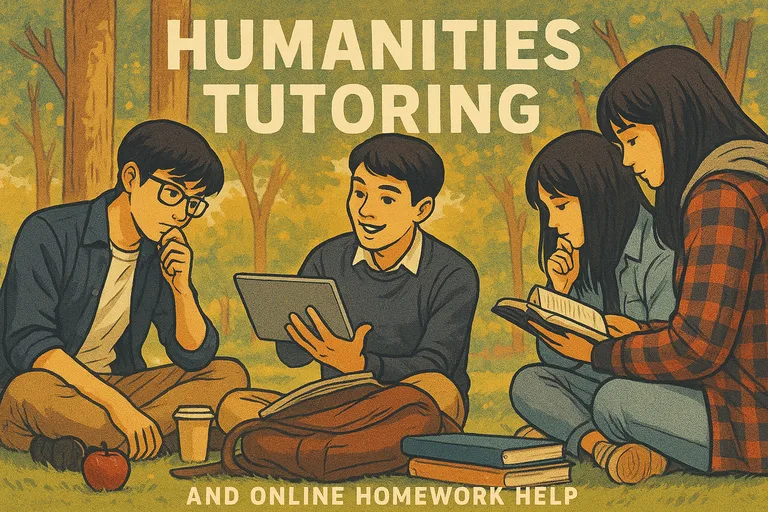
Why Humanities Matter
Humanities subjects like history, literature, philosophy, and languages help students understand human culture, values, and ideas. These courses teach critical thinking, clear writing, empathy, and cultural awareness. For example, Oxford University research found that studying humanities provides students with vital skills for their careers and resilience to change. Employers also note that humanities graduates develop communication, creativity, and critical-thinking skills that are highly valued. For instance, AP History or A-Level English students often use tutors to prepare for challenging exams.
Despite the focus on STEM, humanities skills remain essential. Studying literature and history nurtures creativity and perspective, helping students analyze new situations using lessons from the past. These abilities benefit many fields beyond school – for instance, discussing classic texts or world events enhances cultural awareness and problem-solving. In fact, the analysis and writing skills gained in humanities courses are prized in business, law, technology, and other careers.
It can be hard to see how history or literature applies to a tech career. This visual breaks down the direct link between these subjects and professional success.
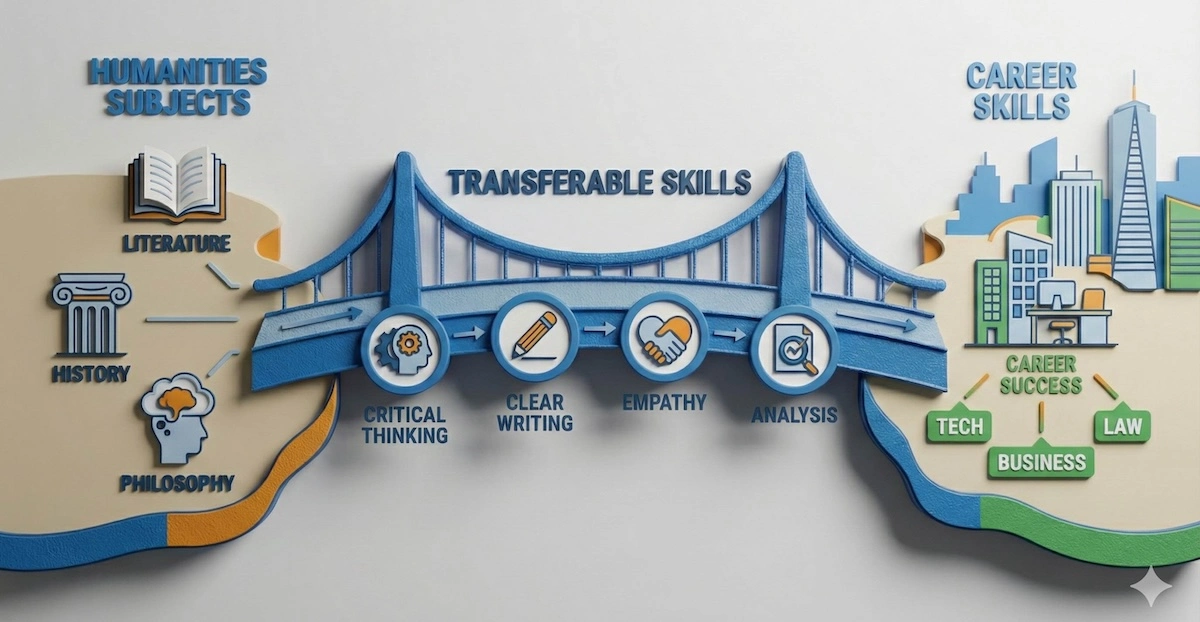
Studying humanities builds the critical thinking and analysis bridges that lead to success in tech, law, and business careers.
As the bridge above illustrates, the analysis skills you build today become the career assets you use tomorrow.
That said, a classroom teacher may not be able to address every student’s questions in a large class. If a student is falling behind, a humanities teacher might recommend hiring a tutor. One-on-one tutoring complements humanities teaching by reinforcing what was learned in class. For example, after themes are introduced in class, a tutor can work with the student one-on-one to dissect a specific chapter or essay in detail. This teamwork of teaching and tutoring helps make challenging subjects more manageable.
The Role of Humanities Tutoring
Personalized Support in Humanities
A humanities tutor is a qualified expert (often a teacher or subject specialist) who works with a student individually or in a small group on topics like history, literature, or philosophy. Tutors focus on the student’s specific needs: they explain confusing concepts in simpler terms, answer questions in depth, and adapt lessons to the student’s pace. This individual attention contrasts with a busy classroom. Tutors might help a student outline an essay, break down a poem, or practice answering exam questions one step at a time.
One-on-one tutoring can dramatically improve learning. Studies show that tutoring interventions can significantly raise academic performance: on average moving a student from the 50th to about the 66th percentile. High-impact programs can yield the equivalent of 3–15 extra months of learning. In practical terms, regular tutoring sessions help close gaps and accelerate progress in any subject, including the humanities.
Benefits of Humanities Tutoring
- Personalized learning: Sessions are tailored to the student’s interests and challenges. For example, a tutor might use examples from a favorite novel or historical period that motivates the student, making the lesson more engaging.
- Confidence and motivation: One-on-one attention often reduces student anxiety and builds confidence. Tutors also set clear goals and deadlines, helping students develop good study habits and stay motivated through regular feedback.
- Skill development: Tutors focus on key humanities skills like writing, analysis, and research. Through practice — such as constructing essay outlines or evaluating sources — students improve their ability to think critically and express themselves clearly.
- Homework and project help: Tutors guide students through essays, presentations, and projects. They provide humanities homework help (often noted as humanities hw help) and humanities assignment help by reviewing drafts, suggesting research strategies, and clarifying assignment expectations. Many tutors will proofread an essay or explain how to approach a history problem, helping reinforce what was taught in class.
- Focus on learning: Good tutors emphasize understanding rather than giving easy answers. They encourage students to think for themselves. For example, rather than doing an essay for the student, a tutor might ask leading questions so the student discovers the argument on their own. This approach ensures students genuinely learn and retain the material.
- Language support: For students learning in a second language, tutors can also focus on comprehension and writing skills in that language, helping them meet humanities course demands.
The advantages of working with a tutor go beyond just better grades. Here is a snapshot of the core benefits you can expect.
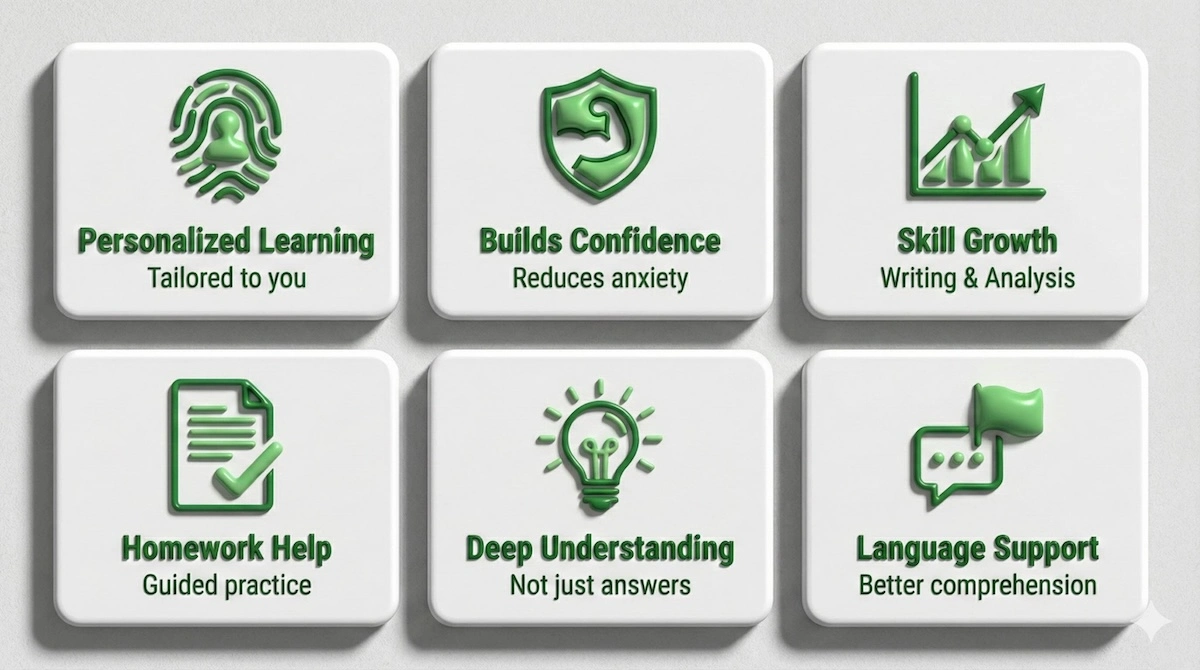
From personalized learning to confidence building, expert tutoring delivers these six key advantages for students.
Whether it’s building confidence or getting specific homework help, these six pillars form the foundation of effective tutoring.
Online vs In-Person Tutoring
Online humanities tutoring has become very popular. Students and tutors connect over video calls and shared documents, allowing help to come from anywhere in the world. This means even if local schools have few experts, a student can work with a tutor in another city or country who specializes in exactly the needed topic. Many find online sessions convenient: you can schedule help in the evenings or weekends without travel. Interactive digital tools (like online whiteboards) can make lessons dynamic and engaging. For instance, a student in a rural town or abroad can connect with expert tutors online just as easily as someone in a big city.
Virtual tutoring also has financial and scheduling advantages. Online sessions often cost a bit less than in-person tutoring. For example, some tutoring platforms list experienced humanities tutors at rates around $20–$30 per hour. These platforms allow flexible scheduling, and students can record or review session materials later. Overall, many families find that humanities tutoring online offers high quality and convenience together.
Of course, some learners prefer face-to-face learning. If a student works best with a live tutor or needs hands-on materials, in-person tutoring may be better. That said, both formats aim for the same goal: helping the student understand and succeed. Consider the student’s learning style, location, and schedule when choosing between in-person or online tutoring.
Finding the Right Humanities Tutor
To get the most out of tutoring, it’s important to choose a tutor who fits the student’s needs and personality. First, identify the specific goals: is it improving essay writing, learning content for a test, or simply enjoying a subject more? When you contact tutors or services, mention these goals so they can match you with the right expert.
Here are some tips for choosing a humanities tutor:
- Credentials: Look for tutors with strong backgrounds in the subject. Many have relevant degrees (e.g., English, history, philosophy) or teaching experience. If possible, check their qualifications or ask for references.
- Experience: Find someone familiar with the curriculum. A tutor who has taught or tutored at the same level (for example AP/IB, A-Levels, or college humanities) will know the expectations and exam formats.
- Communication: A great tutor explains ideas clearly and listens carefully. During a trial lesson, see if the tutor is patient and uses examples that make sense. They should encourage questions and engage the student, not just lecture at them.
- Trial session: Many tutors offer a trial lesson. Use this to check compatibility. Does the student feel comfortable? Does the tutor tailor the session to the student’s interests? A brief session can show if the pair works well together.
- Learning approach: The best tutors help students learn the process. They guide students to solve problems themselves and check understanding, rather than simply giving answers. For example, a tutor might suggest brainstorming ideas together for an essay rather than writing it for the student. This builds skills for long-term success.
- Online vs in-person: Decide which format works better. An online humanities tutor can offer more scheduling options and a wider choice of specialists. If you prefer face-to-face help, look for a qualified tutor nearby. Either way, make sure the tutor is comfortable using any required technology or meeting materials.
Struggling to decide between meeting online or face-to-face? The comparison table below highlights the key differences to help you choose.
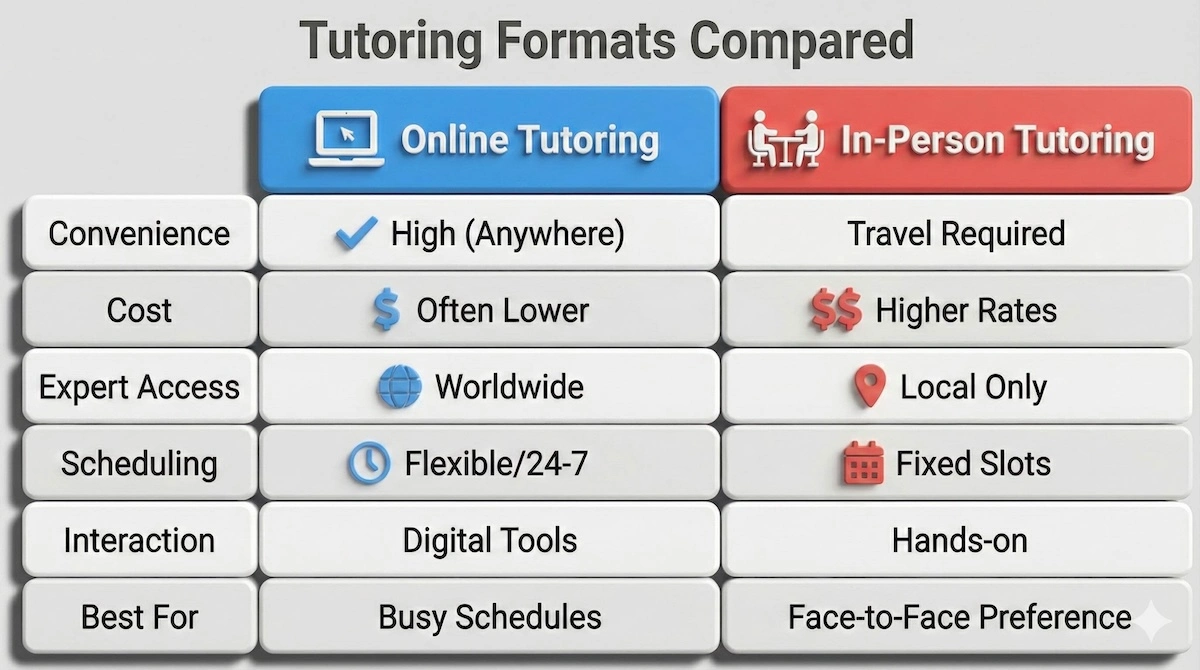
Compare online and in-person tutoring options to see which format fits your schedule, budget, and learning style best.
For many modern students, the flexibility and cost-effectiveness of online options make it the clear winner.
- Personal rapport: Make sure the tutor’s personality meshes with the student. A friendly rapport often leads to more productive and engaging sessions.
- Cost and scheduling: Discuss the tutor’s rates and availability to ensure they fit your budget and schedule (for example, some tutors offer discounts for multiple sessions).
Ready to find a tutor but not sure where to start? Follow this step-by-step roadmap to ensure you hire the right match.
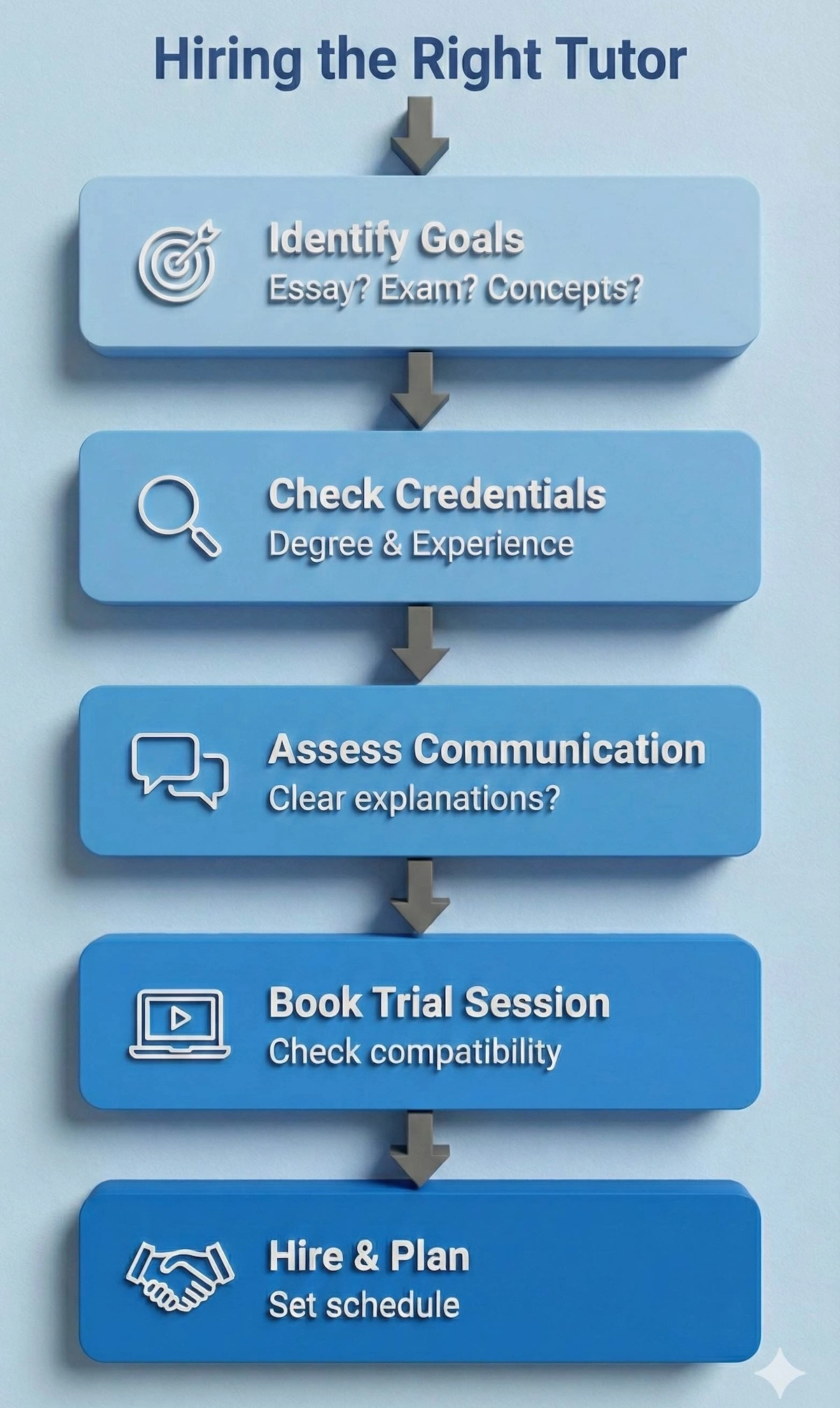
Follow this simple five-step process to find and hire the perfect humanities tutor for your specific academic goals.
Taking time to validate credentials and book a trial session in step 4 is crucial for long-term success.
Once you have a few candidates, discuss goals and expectations. A good tutor will ask about the student’s struggles and set clear objectives (like improving essay skills or exam scores). Schools and teachers often recommend tutoring for students who need extra help. In some countries, such as in Gulf schools where British or IB curricula are common, families frequently hire online humanities tutors to meet rigorous standards. Ultimately, the best tutor is one who connects with the student and can make learning engaging. Many tutoring platforms show tutor profiles with ratings and reviews, allowing you to find an instructor who matches the student’s needs.
Real Student Success Story
Imagine Sarah, a high school senior who loved learning but struggled with essay writing. History assignments felt tedious, and literature readings seemed confusing. Her parents found her a humanities tutor online who specialized in English and history. The tutor discovered that Sarah loved storytelling, so she turned textbook facts into a narrative game and related Shakespearean themes to Sarah’s favorite movies. Each week they worked on one piece of writing, discussing feedback together.
Within a few months, Sarah’s confidence soared. She started volunteering answers in class and even enjoyed the process of writing an essay. On her next exam, she used clear outlines and relevant examples—the skills her tutor had taught her. By graduation, Sarah said tutoring had transformed her attitude: what once was a source of stress became an area of pride.
Sarah’s story isn’t unique; it follows a predictable pattern of improvement. This diagram maps out that journey from frustration to mastery.
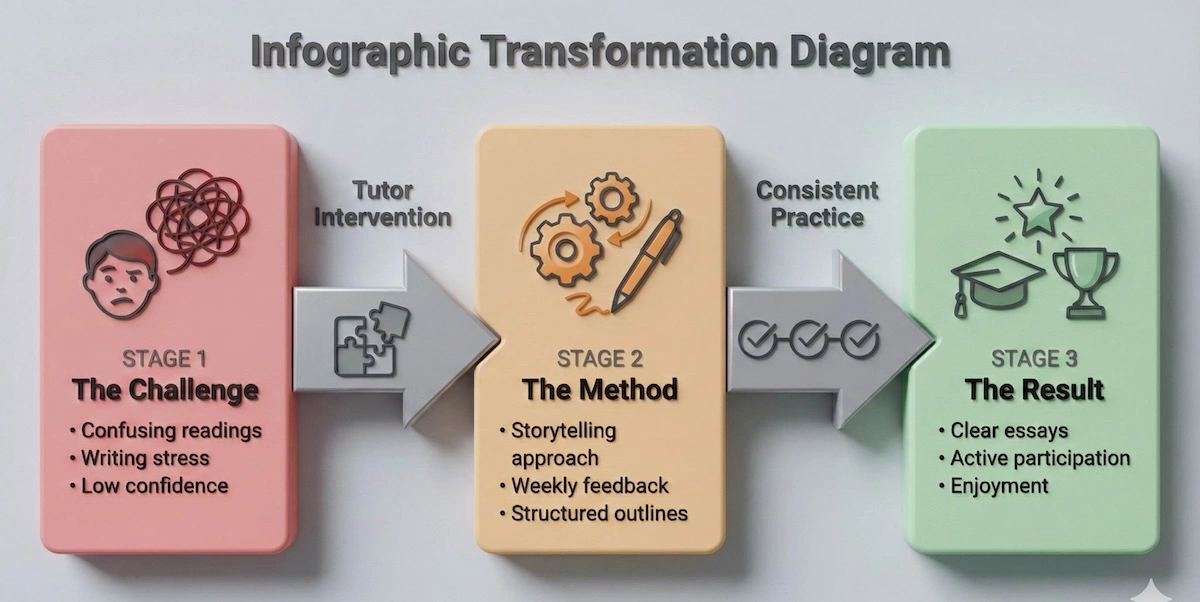
See how targeted tutoring transforms academic confusion into confidence through a structured support process.
With the right intervention, this same transformation is possible for any student struggling with humanities.
Her story illustrates how targeted humanities tutoring can turn frustration into success, making once-daunting material understandable and even enjoyable.
In another example, a middle-school student who struggled with world history became excited about the subject when his tutor tied lessons to the stories from his favorite video games. This personalized approach turned rote memorization into a fun exploration of the past, showing that a tutor can make learning enjoyable for any age.
Getting Started with Humanities Tutoring
If you’re considering tutoring, start by identifying goals. Do you need help with homework, exam prep, or understanding a particular topic? Write down these goals and mention them when contacting tutors or services; this helps them find the right match. It can also help to ask teachers or counselors, as they may know good tutors. Many tutoring platforms show tutor profiles with ratings and reviews, allowing you to find an instructor who matches the student’s needs.
Keep in mind the cost and logistics. Tutoring rates vary widely. One study found tutors may charge anywhere from $18 to over $100 per hour, with an average around $24. Humanities tutors typically fall in the mid-$20s per hour, and online tutoring can sometimes be cheaper. Check whether tutors offer package deals or discounts for multiple sessions. For example, some tutors specialize in writing, others in test prep – choose someone whose strengths match your goals. Make sure to choose a schedule that fits the student’s routine (many tutors offer after-school and weekend sessions).
Don’t wait until grades have already dropped. Starting tutoring early can prevent small gaps from becoming big problems. Humanities courses often build on earlier material, so getting humanities homework help or extra practice as soon as challenges arise pays off. With regular support from a skilled tutor, challenging topics become clearer and students often develop a lasting interest in learning.
In summary, whether students seek humanities homework help, assignment support, or general tutoring, the goal is the same: making challenging subjects clearer, building critical skills, and boosting confidence. With the right tutor and personalized support, any student can transform frustration into success and discover a deeper interest in history, literature, and other humanities fields.
Frequently Asked Questions
Q: What is humanities tutoring?
A: Humanities tutoring is personalized, one-on-one support in subjects like history, literature, philosophy, and related fields to help a student improve understanding and skills.
Q: How does humanities tutoring online work?
A: In online humanities tutoring, a student and tutor meet via video call or digital platform so the tutor can teach and answer questions remotely using online tools.
Q: What does a humanities tutor do?
A: A humanities tutor clarifies course material, guides students through readings and essays, gives feedback on writing, and teaches study strategies for humanities subjects.
Q: Who benefits from humanities tutoring?
A: Any student who struggles with or wants to excel in humanities courses (history, literature, languages, etc.) can benefit from tutoring support.
Q: What is humanities homework help?
A: Humanities homework help refers to tutoring assistance focused on assignments in subjects like history and literature, such as writing essays, analyzing texts, or preparing projects.
Q: How do I hire a humanities tutor?
A: You can hire a humanities tutor through reputable online tutoring platforms, tutoring agencies, or local listings, by selecting someone with the right expertise and experience.
Subjects come under Humanities:
Accounts
Art
Communication & Media Studies
Drama
Fashion Studies
Fiction
Fine Arts
History
Illustration
Journalism
Language
Linguistics
Literature
Literature Review
Management
Music
Philosophy
Public Speaking
Social Science
Social Studies
Sociology
******************************
This article provides general educational guidance only. It is NOT official exam policy, professional academic advice, or guaranteed results. Always verify information with your school, official exam boards (College Board, Cambridge, IB), or qualified professionals before making decisions. Read Full Policies & Disclaimer , Contact Us To Report An Error

